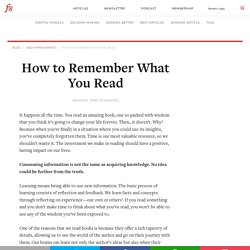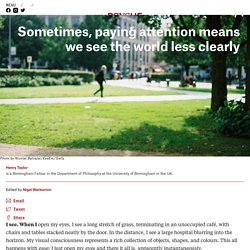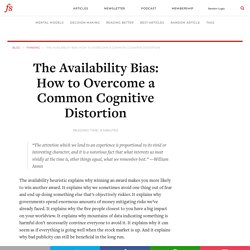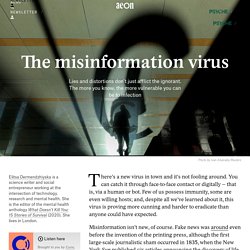

HEC TALKS: A Conversation between Nobel Laureate Daniel Kahneman and HEC Professor Olivier Sibony. How to Remember What You Read. It happens all the time.

You read an amazing book, one so packed with wisdom that you think it’s going to change your life forever. Then…it doesn’t. Why? Because when you’re finally in a situation where you could use its insights, you’ve completely forgotten them. Time is our most valuable resource, so we shouldn’t waste it. Cerveau & Psycho - Le magazine de référence en psychologie et neurosciences. Cultivate Team Learning with Xtrem Reading. Key Takeaways Become a Learning Organization to be able to adapt Xtrem Reading: a first step to the Learning Organization Learn how to read in an extreme way: 2 books in 1 hour collectively Xtrem Reading as a cure to the Tsundoku syndrome Xtrem Reading can help you reduce your human debt and improve cohesion Title proposals: Team Learning with Xtrem Reading, To the Learning Organization, Cultivate Team Learning with Xtrem Reading With this pandemic, the adaptability of our organizations has been put to the test.

To adapt, they have to continually enhance their capabilities to adapt and finally survive. How could our organizations achieve that? The Method of Loci: Build Your Memory Palace. “When information goes ‘in one ear and out the other,’ it’s often because it doesn’t have anything to stick to.”

—Joshua Foer According to legend, the renowned Greek lyric poet Simonides of Ceos was dining at the home of a wealthy nobleman one night when he received word that two young men were waiting outside with a message for him. Sometimes, paying attention means we see the world less clearly. I see.

When I open my eyes, I see a long stretch of grass, terminating in an unoccupied café, with chairs and tables stacked neatly by the door. In the distance, I see a large hospital blurring into the horizon. The Availability Bias: How to Overcome a Common Cognitive Distortion. “The attention which we lend to an experience is proportional to its vivid or interesting character, and it is a notorious fact that what interests us most vividly at the time is, other things equal, what we remember best.”

—William James The availability heuristic explains why winning an award makes you more likely to win another award. It explains why we sometimes avoid one thing out of fear and end up doing something else that’s objectively riskier. It explains why governments spend enormous amounts of money mitigating risks we’ve already faced. Traitement TDAH : tout sur le parental training ! TDAH. Amener les élèves à pratiquer la métacognition et à gagner en confiance en eux - Apprendre, réviser, mémoriser. 6 étapes pour créer un palais de mémoire (mémoriser efficacement à long terme) Inversion: The Power of Avoiding Stupidity. Charlie Munger, the business partner of Warren Buffett and Vice Chairman of Berkshire Hathaway, is famous for his quote “All I want to know is where I’m going to die, so I’ll never go there.”

That thinking was inspired by the German mathematician Carl Gustav Jacob Jacobi, famous for some work on elliptic functions that I’ll never understand. Jacobi often solved difficult problems by following a simple strategy: “man muss immer umkehren” (or loosely translated, “invert, always invert.”) “[Jacobi] knew that it is in the nature of things that many hard problems are best solved when they are addressed backward,” Munger counsels. While Jacobi applied inversion mostly to mathematics, the model is one of the most powerful mental models in our toolkit.
Why humans find it so hard to let go of false beliefs. There’s a new virus in town and it’s not fooling around.

You can catch it through face-to-face contact or digitally – that is, via a human or bot. Few of us possess immunity, some are even willing hosts; and, despite all we’ve learned about it, this virus is proving more cunning and harder to eradicate than anyone could have expected. Misinformation isn’t new, of course. Fake news was around even before the invention of the printing press, although the first large-scale journalistic sham occurred in 1835, when the New York Sun published six articles announcing the discovery of life on the Moon (specifically, unicorns, bat men and bipedal beavers). How to calm your inner storm. When emotions are already intense, it’s often hard to think about what you can do to help yourself, so the first thing you need to work on is getting re-regulated as quickly as possible.

Here are some fast-acting skills that work by changing your body’s chemistry; it will be most helpful if you first try these before you’re in an emotional situation, so you know how to use them. Try some quick-fix ideas to re-regulate Do a forward bend: this is my favourite re-regulating skill. Bend over as though you’re trying to touch your toes (it doesn’t matter if you can actually touch your toes; you can also do this sitting down if you need to, by sticking your head between your knees).
Take some slow, deep breaths, and hang out there for a little while (30 to 60 seconds if you can). How to think like a detective. Step 1: Assume nothing and find out what you really know To think like an expert detective, you have to embrace a so-called ‘investigative mindset’.

The terms ‘possibly’ and ‘could’ should be your watchwords as they are in every real investigation and at every crime scene.